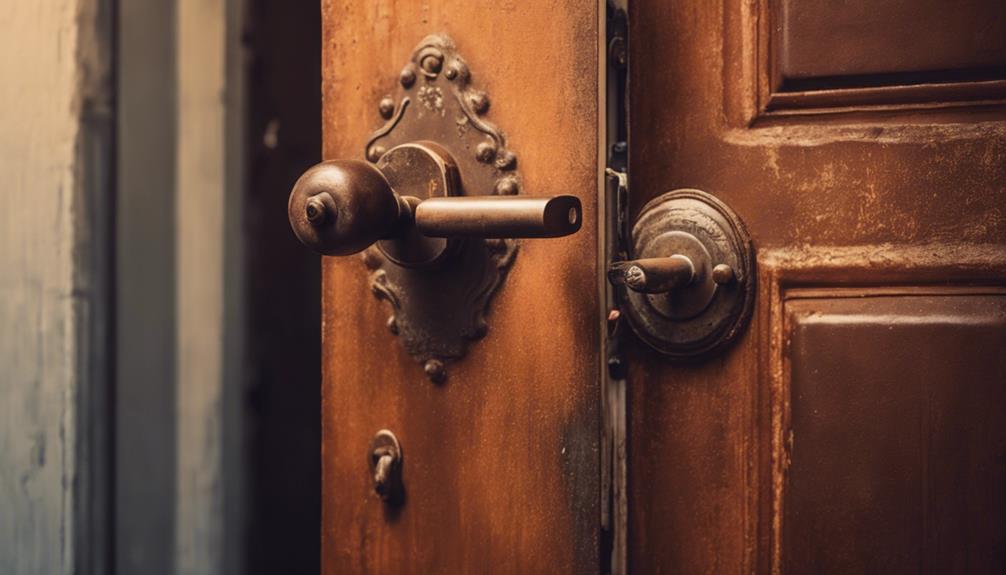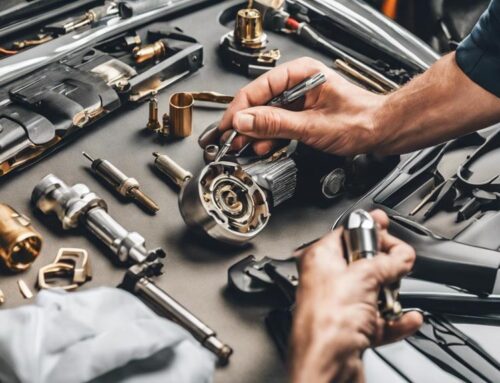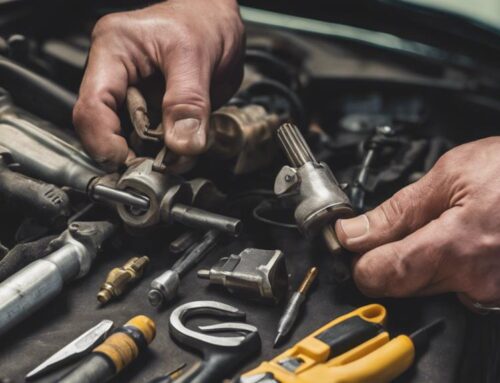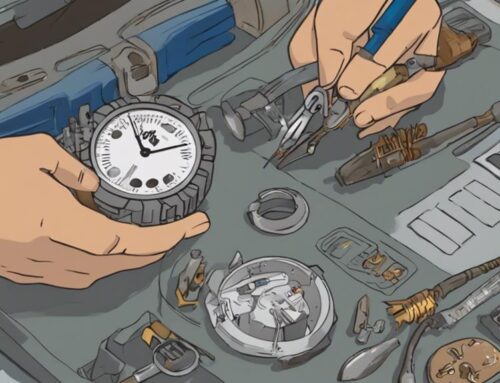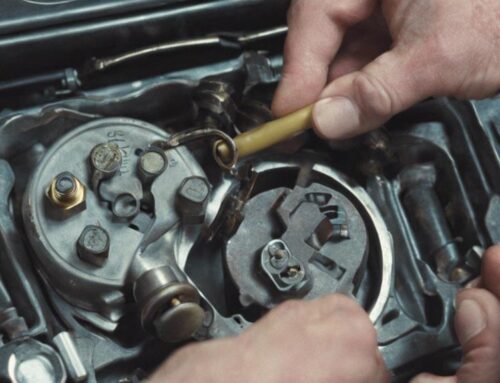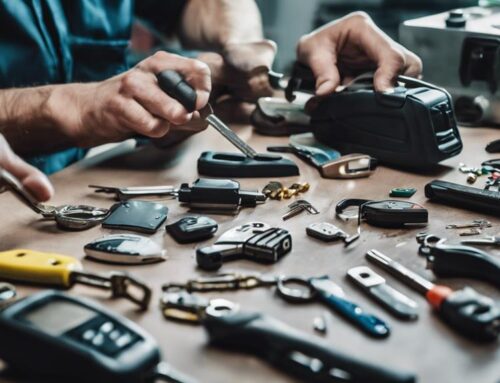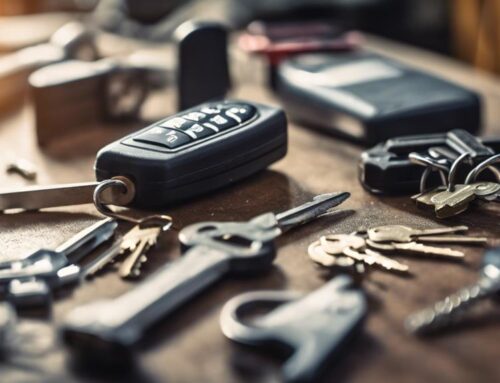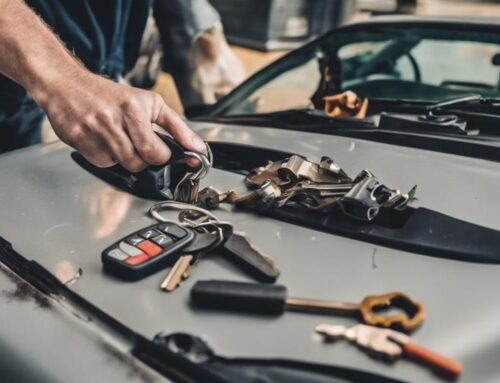You should consider replacing your locks if you notice difficulty turning the key, visible rust, or a wobbly doorknob. These issues often indicate wear and tear or corrosion, which can compromise your lock’s effectiveness. After a security breach, like a break-in or if your keys are stolen, it’s crucial to change your locks to maintain security. Additionally, if your locks are outdated or show significant signs of damage, upgrading to newer, high-security models is advisable. Tackling these issues promptly guarantees your home remains secure. Exploring further can provide you with a detailed understanding of how a lock upgrade can enhance your home security.
Signs of Lock Wear and Tear
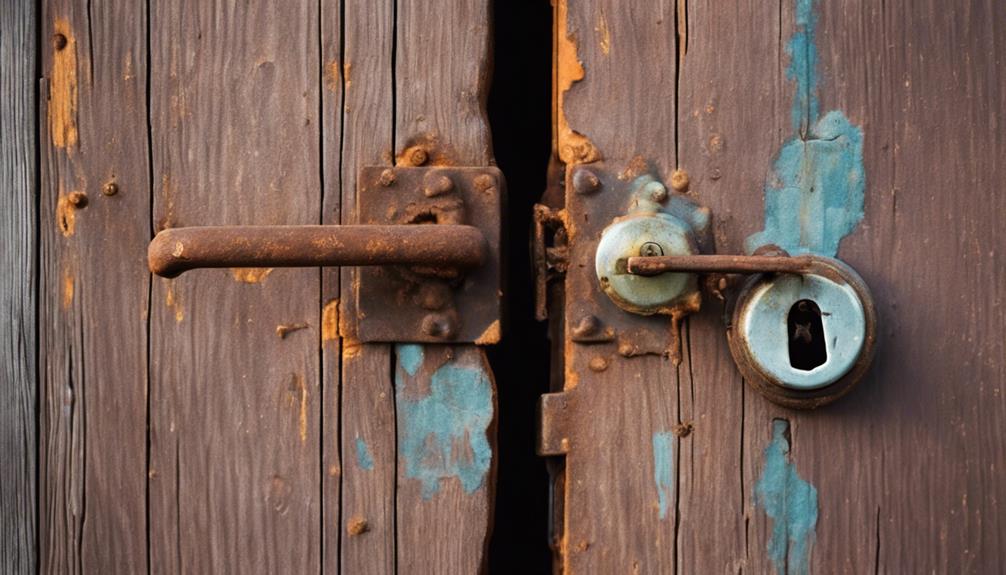
If you notice visible rust or struggle with turning your key, it’s likely time to replace your worn-out locks. Rust is the archenemy of metal, and when it starts creeping up on your door locks, it’s not just an eyesore—it’s a red flag waving at you to get moving on lock replacement. Older locks might give you a workout more intense than your gym session, just trying to get the key to turn. If you’re playing tug-of-war with your lock every time you enter or exit, it’s a clear sign that your lock’s best days are behind it. Don’t wait until you’re locked out in your pajamas; tackle that lock replacement and save your dignity.
Recent Security Breaches
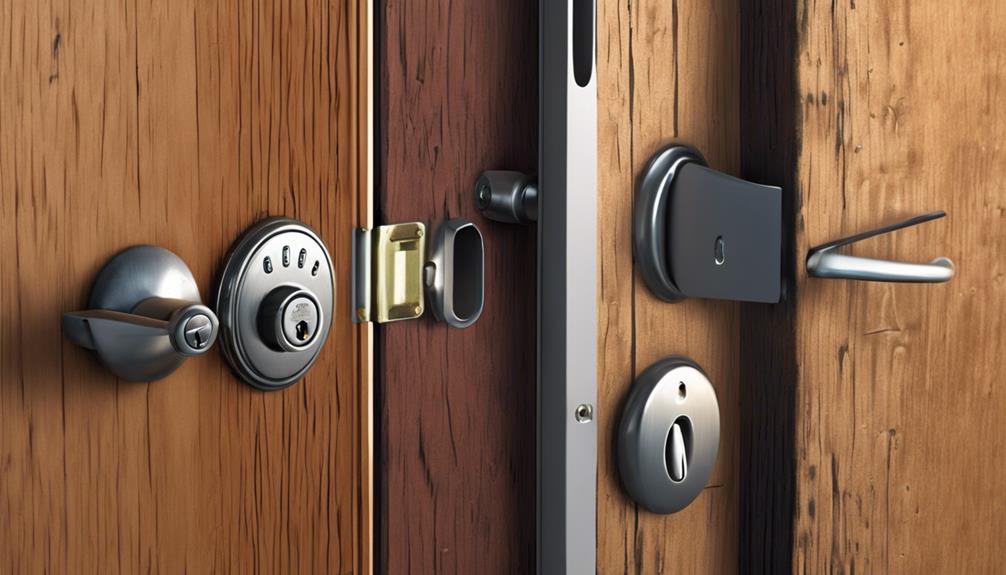
If your property has been compromised through a break-in, it’s important to understand the methods used by intruders. By identifying common breach techniques, you can better prepare and prevent future incidents. Upgrading your locks is a vital step in enhancing your security measures against unauthorized access.
Common Breach Methods
Recent security breaches often involve burglars tampering with or picking locks, highlighting vulnerabilities in your current security measures. If you’ve noticed signs you need a lock upgrade, like a recent break-in or a broken lock, it’s time to listen up! Burglars are getting craftier, and your tired old locks might as well be sending them a handwritten invite.
Around 6-7% of these sneaky entries happen because someone snagged a key. Yikes! That’s like giving them the password to your digital diary. If the neighborhood chatter includes tales of break-ins and jimmied locks, that’s your cue. Don’t wait for a personal “surprise visit” to realize your locks are more vintage than security. Time for an upgrade, perhaps?
Preventing Future Incidents
To prevent future incidents, consider replacing your locks immediately after any security breach. Seriously, if you’ve had a recent security breach, it’s like your door lock sent you a “Mayday!” signal. Don’t ignore it! Upgrading your locks can be the hero move that keeps those pesky intruders at bay. Think about it—leaving old locks in place after a break-in is like telling potential burglars, “Come on back, the door’s still open!” Lock replacement isn’t just a good idea; it’s your home’s frontline defense. By addressing lock vulnerabilities swiftly, you not only deter future break-ins but also give yourself peace of mind. Remember, an ounce of prevention is worth a pound of cure, especially with locks!
Issues After a Break-In
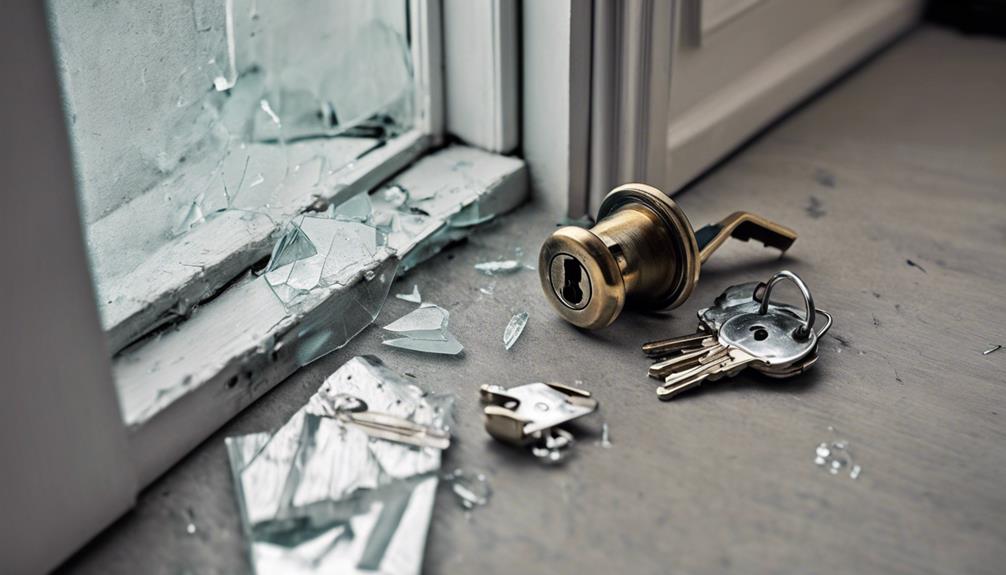
After a break-in, it’s important to evaluate any damage to your locks to determine their integrity. You’ll need to contemplate enhancing your security measures, possibly by upgrading to a more robust system. Whether to repair or replace the compromised locks is a key decision that impacts your future security.
Assessing Lock Damage
If you notice scratches, dents, or other damage on your lock after a break-in, it’s important to replace it to guarantee your security. Seeing these signs of forced entry means your lock’s had a rough night—like the aftermath of a toddler’s birthday party. These battle scars indicate your lock was tampered with, which is a big red flag. It’s like finding out someone tried to hack your email—time to change the password!
If your lock feels wonky, doesn’t function like it used to, or practically winks at you with all its new scratches and dents, don’t just stand there—get it replaced! Remember, a compromised lock is about as useful as a chocolate teapot.
Enhancing Security Measures
Enhancing your home’s security measures becomes essential once you’ve experienced a break-in. If you’ve had the unwelcome “pleasure” of a break-in, it’s time to take a good, hard look at your locks. Sure, that old lock might have sentimental value, resembling something from a medieval dungeon, but let’s face it, it’s about as secure as a diary with a glittery unicorn on it. Post-invasion, your locks need to be replaced, especially if they show signs of tampering. Opt for high-security locks this time to keep those pesky intruders at bay. Because really, the only thing you want picking your locks should be you, when you’ve forgotten your keys, not a burglar!
Repair Vs. Replacement Options
While considering your lock’s security after a break-in, you must weigh the pros and cons of repairing versus replacing them. If your lock’s had a rough night and looks more like a modern art piece, they might need to be replaced. Let’s face it, slapping a band-aid on a lock that’s been jimmied or jostled could leave you feeling insecure. Upgrading to new, high-security locks isn’t just smart; it’s akin to swapping your old flip phone for the latest smartphone—both a fresh start and a significant upgrade. Replacement not only restores your peace of mind but also guarantees that any sneaky future intruders get a nice, hard ‘access denied‘!
Lost or Stolen Keys
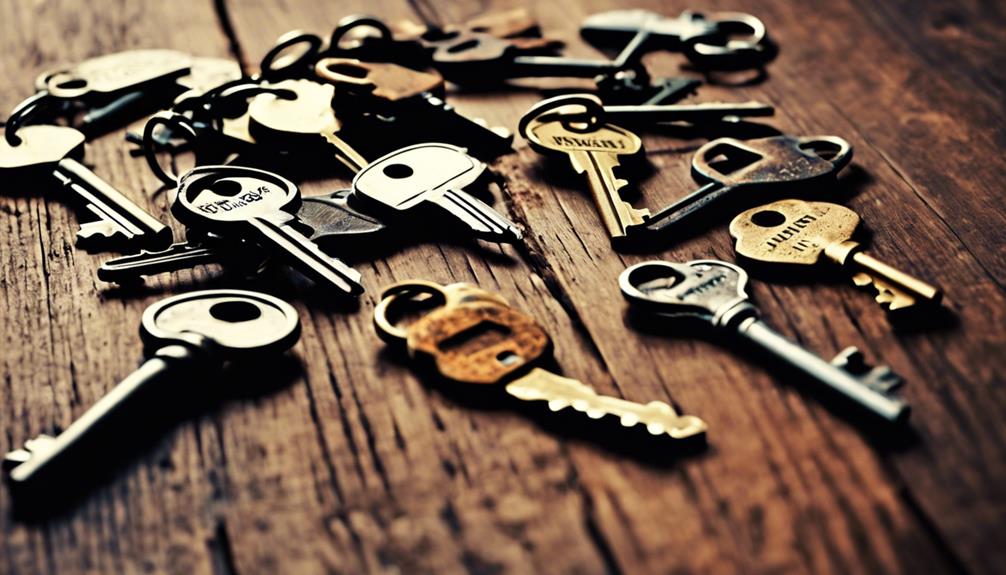
Imagine this: 6-7% of burglars simply stroll in using a key. Scary, right? If your keys disappear, whether lost or stolen, the security of your castle (or modest studio apartment) is compromised. Prompt lock replacement isn’t just recommended; it’s a must to keep the baddies out. Misplaced keys aren’t just an ‘oops’ moment—they’re a red flag waving high, signaling potential home invasions or office infiltrations. Don’t wait for a thief’s RSVP; act fast, replace those locks, and keep your peace of mind intact. Remember, it’s better to be safe than to come home to unexpected ‘guests’!
Major Life Changes

As you navigate through major life changes like moving or a divorce, consider replacing your locks to secure your new circumstances. If you’ve moved into a new pad or recently untied the knot, it’s Time to Replace those old locks to keep out unwanted ‘guests.’ Here’s a quick cheat sheet to decide if your locks need a refresh:
| Life Event | Time to Replace? | Why? |
|---|---|---|
| Moved into a new home | Yes | Fresh start |
| Divorce | Yes | Privacy upgrade |
| Neighborhood break-ins | Maybe | Safety concerns |
Upgrading for Better Security
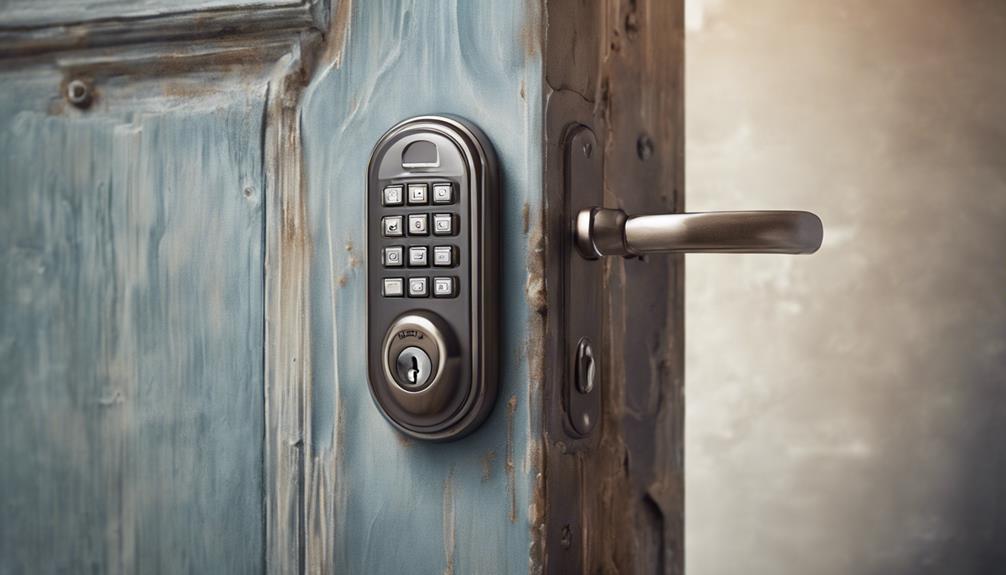
Beyond securing new circumstances, upgrading your locks offers enhanced protection against potential threats. Let’s face it, your old locks might have more experience but are they really up to the challenge of today’s cunning intruders? Investing in high-security locks not only deters those pesky burglars but also boosts your nighttime comfort level from “mildly paranoid” to “sleeping like a baby.”
New lock technology isn’t just about turning a key; it’s about turning away threats before they even touch the doorknob. Upgrading isn’t just a safety measure—it’s your home’s very own VIP security detail. So, give your property the upgrade it deserves, and let those upgraded locks flex their muscles against security breaches. You’ll thank yourself later!
Frequent Lock Jams
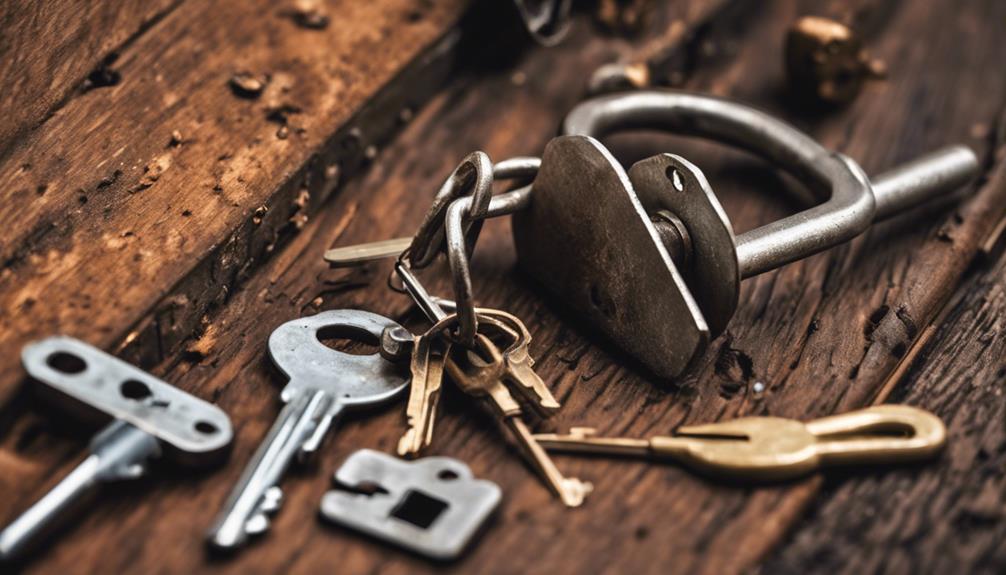
If you’re frequently dealing with lock jams, it’s often a clear sign that the lock mechanism may be failing. Sure, it’s not as dramatic as your door swinging open with a ghostly creak, but it’s pesky enough! Imagine wrestling with your lock every time you just want to step out for a latte. Not fun, right?
Persistent lock jams can mean your lock is throwing a tantrum and needs to be replaced before it decides to retire completely. If you’ve noticed that using your key feels more like a safe-cracking scene from a heist movie, it’s a big, red flag. Don’t wait until you’re locked out—or in! Address those lock jams, or wave your security goodbye.
Choosing a Reliable Locksmith
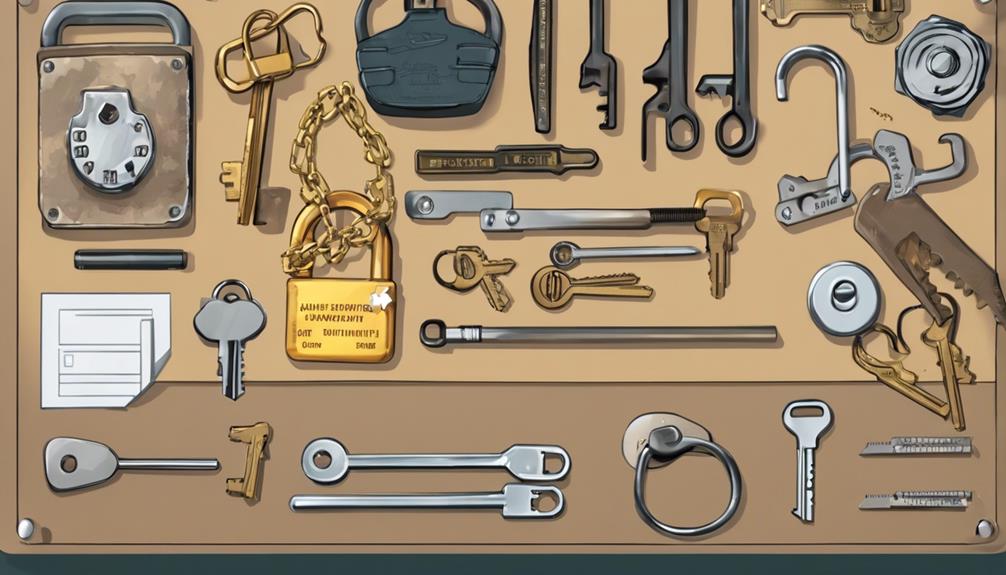
When you need to replace your locks, choosing a trustworthy locksmith is crucial to guarantee your security isn’t compromised. Don’t let your new home become a comedy club for burglars! First off, check that the locksmith offers 24/7 emergency services. Nothing says ‘oops’ like being locked out at midnight with no help in sight. Make sure they’re licensed and insured, so you’re not just inviting any Tom, Dick, or Harry with a toolbox into your home. Ask for a written estimate to avoid the classic ‘It’ll only cost ya a small fortune’ surprise. And remember to scour online reviews or ask your pals for referrals. Got a unique type of lock? Contact us and make sure it gets the star treatment it deserves!
Frequently Asked Questions
Can Weather Conditions Affect My Locks’ Longevity?
Yes, weather conditions can indeed mess with your locks’ longevity. Harsh weather like heavy rain, snow, and extreme temperatures can lead to rust, corrosion, and even mess up the internal mechanisms. If you’re noticing your locks are sticking or acting up, it’s probably due to these conditions. Regular maintenance like lubrication can help, but sometimes, you just need to admit defeat and replace those weather-worn locks.
Are Smart Locks More Secure Than Traditional Locks?
You’re wondering if smart locks are more secure than traditional locks? Absolutely! Smart locks offer encryption, biometric options, and can even alert you on your phone if something’s amiss. They integrate into home automation systems for extra convenience, making them a tougher nut to crack compared to old-school locks that just sit there waiting to be picked. So yes, upgrading to a smart lock definitely amps up your security game!
How Often Should I Clean My Locks?
Just like your car needs an oil change, your locks need a good scrub every 6-12 months. Keeping them clean not only extends their life but also keeps them working smoothly. Grab a soft brush or cloth to dust off the grime, and don’t forget to give them a spritz of graphite or silicone spray afterwards. Regular cleaning helps catch any wear or damage early, saving you from bigger headaches down the road.
What Are the Signs of Lock Tampering?
If you’re wondering about lock tampering, keep an eye out for scratches around the keyhole, a misaligned keyway, or a key that doesn’t turn smoothly. Signs of forced entry, like broken parts, are major red flags. Also, if your lock’s appearance changes mysteriously or it starts acting up, like needing different keys unexpectedly, these are signs someone might be messing with your locks. It’s important to stay alert to these changes.
Is Rekeying a Lock Cheaper Than Replacing It?
Yes, rekeying a lock is generally cheaper than replacing it. If you’re just looking to change who has access without the fuss of a full hardware swap, rekeying is your wallet-friendly friend. It typically costs between $50 to $150, whereas replacing the entire lock can set you back $75 to $250. So, if your lock’s still in good shape, rekeying is a savvy choice to save some cash.

